Healthy Turkey Dog Food Nutritious & Delicious Meal for Pup
Dog owners always look for healthy, hypoallergenic, and protein diets for their dogs. The search has continued for years. We have a solution to this concern.
Turkey dog foods have been widely demanded by pet owners who seek the health, nutrition, and hypoallergenic diet for their dogs. Turkey is also a relatively lean protein food that has some advantages to the body, these include enhanced digestion, better skin, and increased energy levels.
Here, we’ll take you through everything you need to know about turkey-based diets for dogs: the advantages, the disadvantages, and where to buy turkey-based foods.
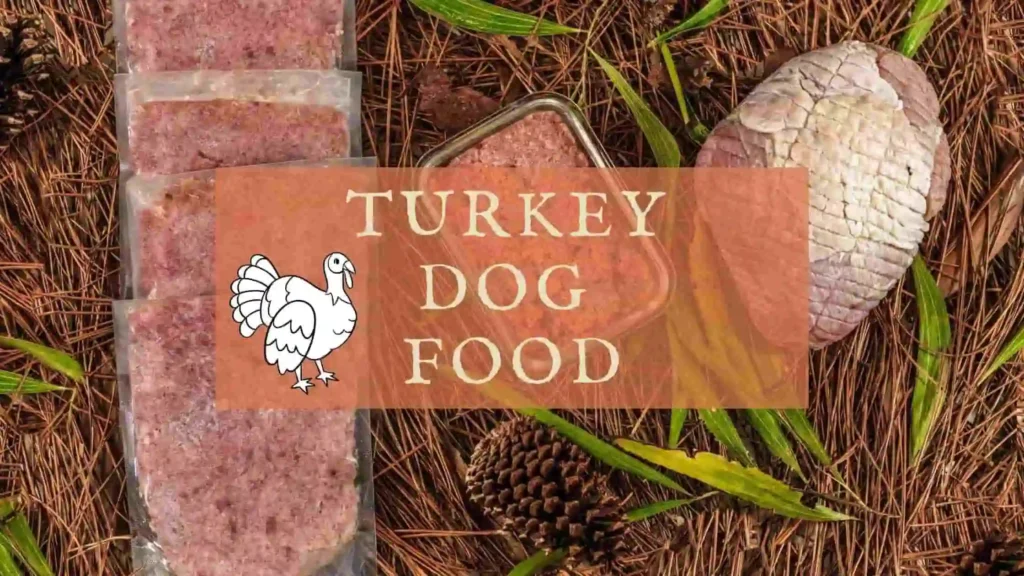
Turkey-Based Dog Food
Turkey dog food prefers the use of turkey meat as the main source of protein in the production of the foods. This type of dog food is quite suitable for dogs that have reactions to other proteins such as beef or chicken.
Turkey is a lean meat that is rich in nutrients foods such as protein, Vitamin B6 and B12, zinc, and niacin. These nutrients are very important for your dog’s well-being, as they promote muscle development, generation of energy, and even immunity to diseases.
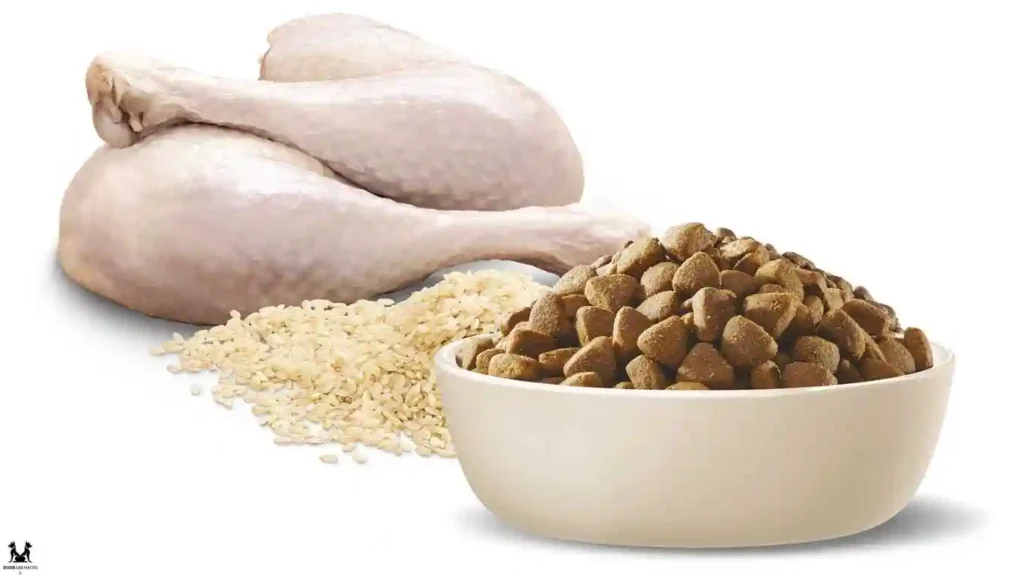
Turkey is prepared with different types of foods which include dry food also known as kibble wet food and raw food. The general aim is to feed the dog with foods that will adequately meet his or her nutritional requirements.
Grain-Free Turkey Dog Food
Grain-free turkey dog food is ideal for dogs with grain allergies or sensitivities. By eliminating grains like wheat, corn, and soy, grain-free turkey food for dogs offers a more digestible and hypoallergenic option. Instead of grains, these formulas often use vegetables like sweet potatoes, peas, or lentils to provide essential carbohydrates and fiber.
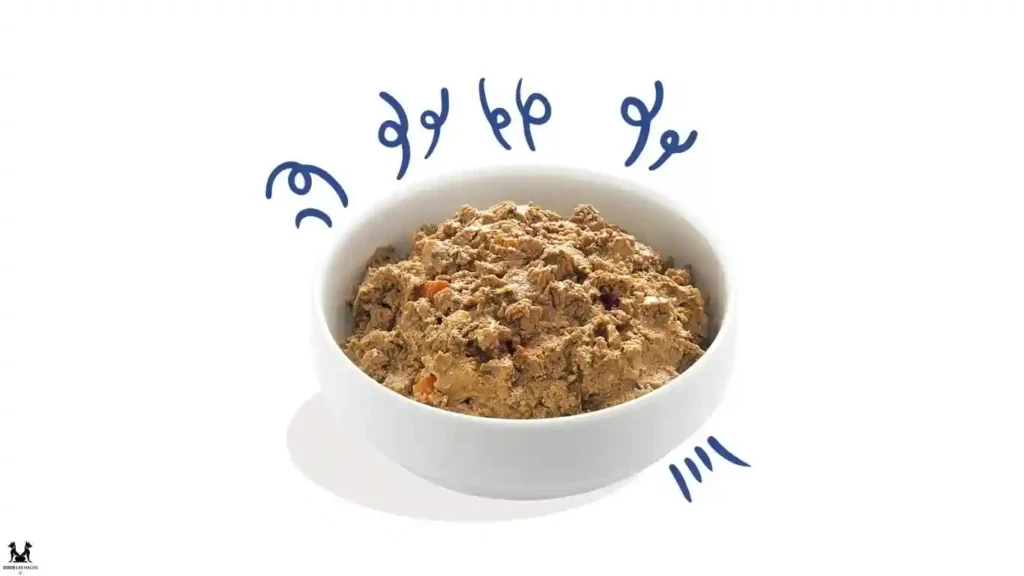
This type of dog food can help alleviate skin irritations, digestive problems, and food sensitivities. However, it’s essential to ensure that your dog still receives a balanced diet, even without grains, by selecting a high-quality grain-free turkey dog food.
Natural Turkey Dogs Food
Natural turkey dog food is also prepared without the use of artificial additives, preservatives, and filler materials making the food safer and healthier for your dog to consume. This type of food based on turkey, vegetables, necessary vitamins, and nutrients does not contain chemical and synthetic vitamins.
Choosing a natural turkey food for dogs averts your dog from the normal commercial foods and makes them get a diet resembling what they would feed on in the wild. This can be especially helpful for the animals that are prone to stomach problems or; reacting to artificial colors. In this case, make sure that you are identifying with natural and quality food for your pet by going through the list of ingredients.
Benefits of Turkey Dogs Food
Turkey dog food comes with numerous benefits that make it a fantastic choice for dogs:
- Lean Protein Source: Turkey contains fewer amounts of fat than most meats including beef, and therefore suitable for feeding dogs that should keep off excess weight.
- Rich in Nutrients: It’s rich in vitamins like the vitamins B6 and B12 which are useful in energy production and for the proper functioning of the brain.
- Allergy-Friendly: Some of the proteins that have often been reported to cause allergies in dogs include chicken, beef, and many others. This type of drink can be very effective for Turkey since it can be used for people suffering from different food intolerances as well.
- Supports Muscle Development: The food is advisable for active and growing dogs since it has a high protein content that aids in rebuilding muscles.
- Digestive Health: Turkey has more facility to digest as compared to other fatty meat and that can decrease digestion problems.
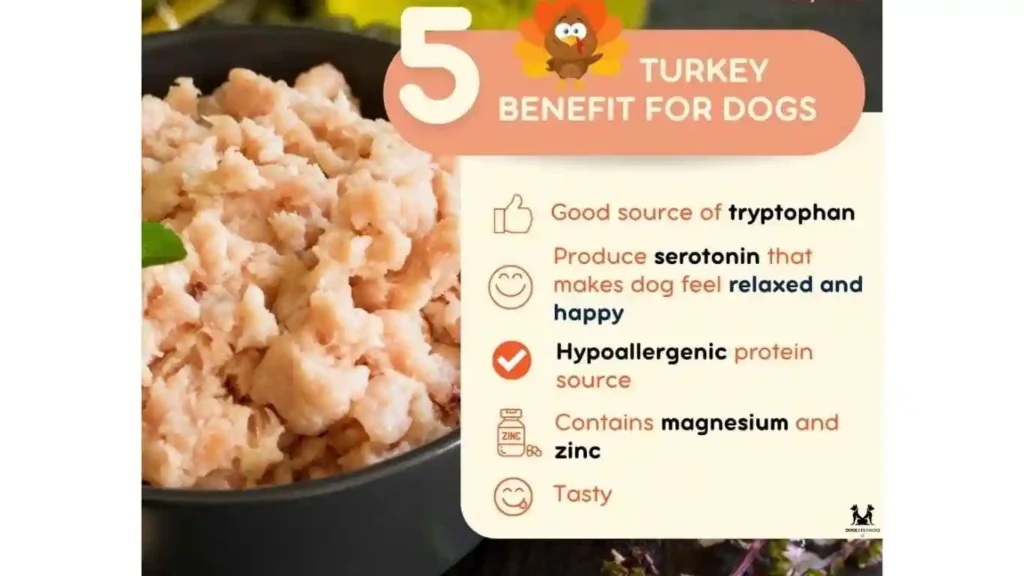
Risks of Turkey Dog Food
While turkey dogs food offers many benefits, there are a few risks to be mindful of:
- Allergic Reactions: As a good animal, turkey is harmless to most dogs but very few will develop an allergy to this bird and this will manifest in symptoms like intense itching, rashes skin, or upset stomach.
- Imbalance in Diet: If the only source of protein comes from turkey then the pet will be deficient in essential fatty acid and certain minerals.
- Raw Turkey Concerns: It is an opportunity to get food to your turkey by using raw turkey as the food you feed your pet but comes with a limitation in the following ways; The raw turkey may contain some bacteria such as Salmonella or E. coli. These risks however could be avoided by proper handling and preparation.
Any changes in the dog’s diet should be discussed with the veterinarian to avoid any underlying health complications.
Turkey and Sweet Potato Dog Food

Turkey and sweet potato dog food has become something people feed their pets because this meal supplies both quality protein and carbohydrates to the pet’s diet. One element of the vegetable is dietary fiber which is useful for the health of the bowels and to avoid constipation in the dog. Besides, these tubers contain vitamins A and C and antioxidants that improve the immunity of dog’s bodies.
This combination proves rather advantageous to dogs with sensitive stomachs or food sensitivities since turkey and sweet potatoes are easy on the gastrointestinal tract, and hardly cause any allergic reactions.
High-Protein Dog Food

Turkey dog food containing high protein is produced to feed dogs with special high protein needs in muscles, energy, and any other area where their bodies need protein to build. Dogs such as working breeds or puppies which are full of energy probably need more protein in their diet because it can reconstruct muscle mass after exercise.
Turkey is low in fat and contains a moderate quantity of calories making it suitable for the preparation of high-protein diets for dogs. Such formulas have more than 30% protein which offers constant energy and contributes to the proper functioning of the body. However special attention must be made to prevent the rest of the diet from lacking in fats and carbohydrates to overload the system of the dog with protein.
Turkey Meal for Dogs

Turkey meal is a concentrated source of turkey that is utilized in lots of commercial dog foods. It is made by frying the turkey meat, which is mostly used to remove almost all the water content, thus making it a rich source of protein. All in all, a turkey meal is valuable for pets’ nutrition and should not be associated with poor-quality meat by-products.
This ingredient is also commonly included in the dry kibble formulas and just like fresh turkey it supplies lean protein, essential vitamins, and minerals but it is easier to stock up and retain. In particular, turkey meal can be exceptionally useful for dogs which require a large amount of protein in their diet.
Turkey-Based Dog Food
Turkey dog food contains turkey meat as the first ingredient in the food. This type of dog food is suitable for those dogs that have problems eating any other protein other than pork. Turkey is a lean meat that has several nutritional benefits, still, it is believed to contain high protein, vitamins B6 and B12, zinc, and niacin. These nutrients are important for the well-being of your dog because they help in the development of muscles, the production of energy, and immunity.
Turkey dog food can be in a dry form which is in the form of small hard pellets, a wet form which is a moist and soft food, or in a raw form. The objective of the dieting is to give a balanced diet for your dog in terms of food requirements.
Natural Turkey-Based Dog Food
The natural turkey dog food does not contain artificial ingredients such as flavors, colors, preservatives, or body fillers making it a cleaner diet for your dog. It deals mainly with natural resources such as turkey, vegetables, and essential nutrients without the addition of chemical vitamins.
Feeding a natural turkey-based dog food is the best way of feeding your dog because it provides almost a natural diet for the natural dog. This option may be especially useful for dogs with stomach issues or specific allergies to synthetic additives. It also prevents, and the best foods to feed your pet are obtained from a list of raw, natural ingredients.
Dog Food with Turkey Flavor
Turkey-flavored dry dog food’s main protein source as the name suggests is usually turkey or turkey meal with some added spices for taste. This option can be preferred for clients, most especially those who probably would not be very excited to take their meals.
These foods can be delicious but it is recommended to read the list of products and ensure that they are of good quality. It’s for this reason that some manufacturers may include artificial flavoring agents that can cause stomach upsets or allergic reactions. Selecting the turkey-flavored dog food and the proper ingredients will make your dog happy while providing him/her with the nutrients needed.
Healthy Turkey Dog Kibble
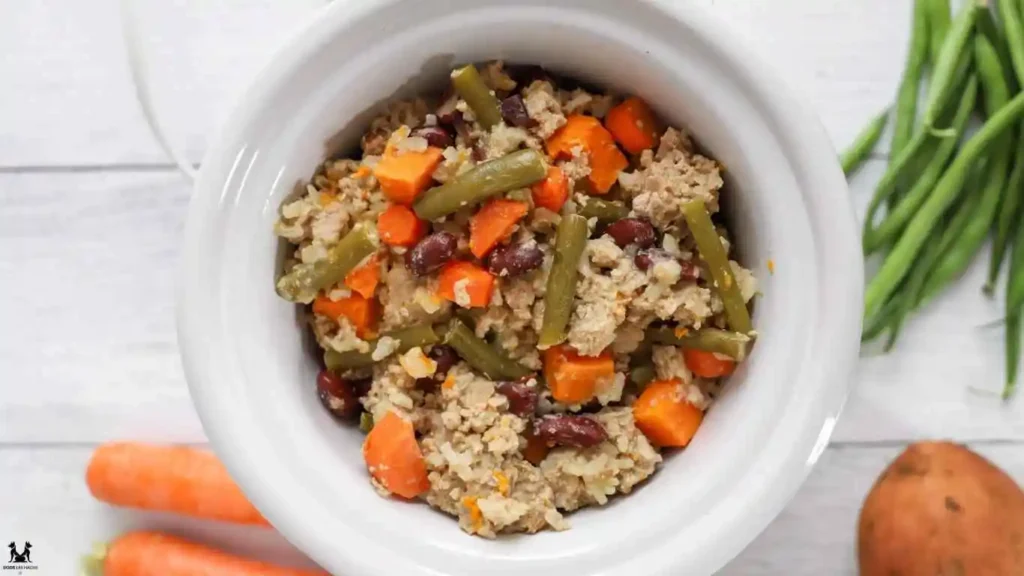
Turkey dog kibble contains turkey as a source of protein and other essential nutrients as a balanced meal for your dog. Properly-made kibble foods often contain such adding as brown rice, peas, carrots, and any other vegetables, with vitamins minerals, and fiber.
When choosing turkey dog kibble consider what is stated on the packaging, choose products with turkey as the first ingredient, other ingredients without artificial preservatives, and no fillers. Protein, healthy fats, and low GI carbohydrates will help keep your dog healthy and energetic and will form the basis of a good kibble.
Raw Turkey-Based Dog Food
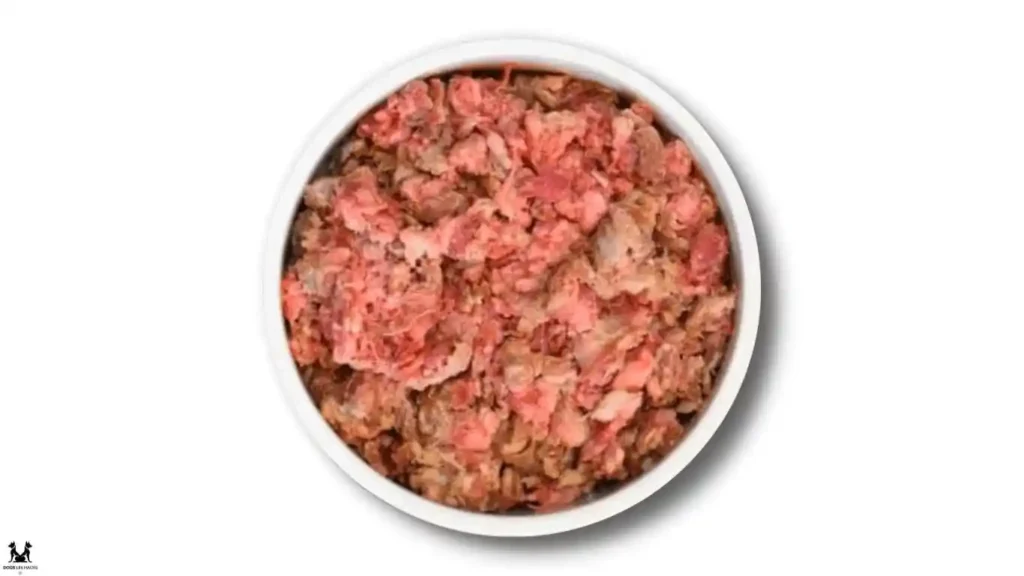
Benefits of Raw Turkey for Dogs
- High in Protein: Raw turkey is a lean source of protein, promoting muscle formation and providing an energy boost for dogs.
- Rich in Vitamins: It contains essential vitamins like B6 and niacin, which support metabolism and overall health.
- Supports Immune System: Turkey is rich in minerals such as zinc and potassium, which help maintain a strong immune system.
- Promotes Healthy Skin and Coat: The nutrients in turkey contribute to healthy skin and a shiny coat.
Risks and Considerations of Feeding Raw Turkey
- Bacterial Contamination: Raw turkey can contain harmful bacteria like Salmonella and E. Coli, posing health risks to both dogs and humans.
- Potential Illness: Exposure to these bacteria can cause serious illnesses in dogs, including gastrointestinal infections.
- Proper Handling Required: Special care must be taken when handling raw turkey to prevent cross-contamination and ensure safety.
- Vet Consultation: It’s essential to consult a veterinarian before feeding raw turkey to ensure it meets your dog’s health needs and safety requirements.
- Balanced Nutrition: Feeding raw turkey should be part of a well-balanced diet, and expert guidance is needed to avoid nutritional imbalances.
Turkey and Rice Dog Food
Nutritional Balance of Turkey and Rice Meals
Turkey and rice dog food provide good support of protein for the dogs, as well as balanced carbohydrate support. Turkey is rich in lean proteins that help build and repair muscles and rice is a mild carbohydrate that gives energy to your dog. This diet is preferable to give to dogs that have sensitive stomachs, and this is because rice has a formula that does not harm the gut.
Benefits for Dogs with Sensitive Stomachs
- Turkey and Rice for Digestive Issues: Ideal for dogs with chronic diarrhea or bloated stomachs.
- Hypoallergenic Combination: Turkey and rice are considered hypoallergenic, making them suitable for dogs with food intolerances or allergies.
- Turkey Preferred Over Beef or Chicken: Turkey is less likely to cause allergic reactions compared to beef or chicken.
- Rice is Gentle on the Stomach: Rice adds volume to meals without causing harm to the digestive system.
Turkey Formula Dog Food
What Is Turkey Formula Dog Food?
Turkey formula dog food is specially prepared for canine consumption and is made almost exclusively from turkey with turkey being its chief ingredient followed by vegetables, grains, and supplements.
Commercial dog foods are created to sustain your dog, especially in situations where you may not feed him a homemade diet, so it is formulated to give your dog all the nutrients that he requires. The ingredients that make up the formula include omega-3 and omega-6 fatty acids for the coats and fiber for the stomach.
Ingredients in Turkey Formula Dog Food
- Primary Ingredients in Turkey Formula Dog Foods: Mostly consist of turkey meat, turkey meal, and sometimes organ meats for higher nutrient density.
- Additional Nutritious Ingredients: May include carrots (rich in vitamins), potatoes or brown rice (rich in carbohydrates), and flaxseed (rich in omega fatty acids).
- Focus on High Protein Content: Choose a turkey formula with a high quantity of protein.
- Avoid Cheap Fillers: Steer clear of formulas containing cheap ingredients like corn or soy.
Turkey Wet Dog Food
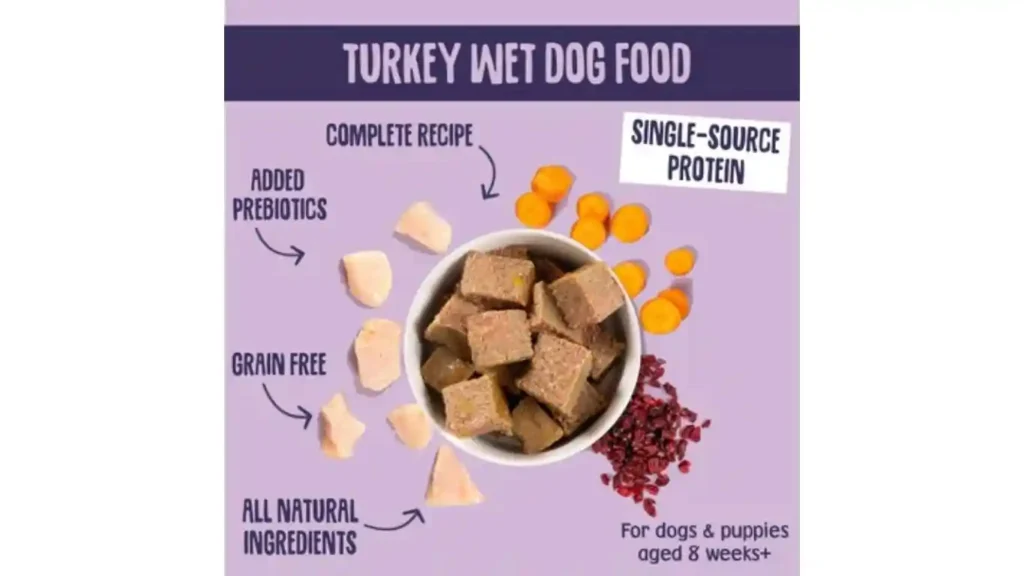
Difference Between Wet and Dry Dog Food
Difference Between Turkey Wet Dog Food and Dry Kibble
| Aspect | Turkey Wet Dog Food | Dry Kibble |
|---|---|---|
| Appeal to Dogs | More enticing, even for picky eaters | Less appealing to choosy dogs |
| Water Content | Contains higher water content, helps hydration | Low water content, requires more drinking |
| Protein Content | Higher protein content | Lower protein content |
| Carbohydrate Content | Lower carbohydrate content | Higher carbohydrate content |
| Diet Suitability | Ideal for dogs needing a higher protein or low-carb diet | Suitable for dogs without special dietary needs |
| Feeding Convenience | May require refrigeration after opening | Easy to store, no refrigeration needed |
Why Choose Turkey Wet Food for Dogs?
Turkey wet dog food has improved flavors, and textures that most dogs cannot resist. It is also less hard on the teeth and easier to chew, making it a great product for seniors or any dog with dental problems.
The high water content is also useful in the case of maintaining the water intake of your dog which will work towards the benefit of the kidneys. Besides, if you add turkey to your wet meals for your dog, then your pet is likely to get a boost of nutrients in his or her system.
Turkey Puppy Food
Special Nutritional Needs of Puppies
Just like human beings, puppies also have different nutritional requirements from adult dogs since they are growing companions that require more protein, fats as well as some vitamins. Puppy food produced in Turkey also contains proteins and fats essential for the growth of muscles and energy needs respectively and also contains other essential minerals including calcium and phosphorus for the growth of bones.
5 Benefits of Turkey-Based Puppy Food
- Low-Fat Content: Turkey is low in fat, promoting healthy growth without excess fat.
- Supports Muscular Development: High in protein, it encourages muscle growth in puppies.
- Rich in B Vitamins: B vitamins aid in brain function and energy production.
- Gentle on the Stomach: Suitable for puppies transitioning from mother’s milk.
- Promotes Healthy Growth: Helps puppies grow into healthy adult dogs.
Dog Nutrition with Turkey
Nutritional Profile of Turkey for Dogs
It is rich in nutrients that are beneficial to the health of dogs, thus making it a very important food to feed the dog. It also has a high concentration of proteins that is required to build up muscles and tissue and it is also rich in amino acids which are essential for the body. Further, turkey is also an excellent source of Vitamin B12 and Vitamin B6 supporting the production of energy and proper metabolism.
Essential Vitamins and Minerals in Turkey
Turkey has nutrients like zinc that enhance the immune system and selenium is an antioxidant needed for the thyroid gland. Such vitamins and minerals aid in maintaining health, and energy as well as preventing your dog from getting other diseases.
Turkey Jerky for Dogs
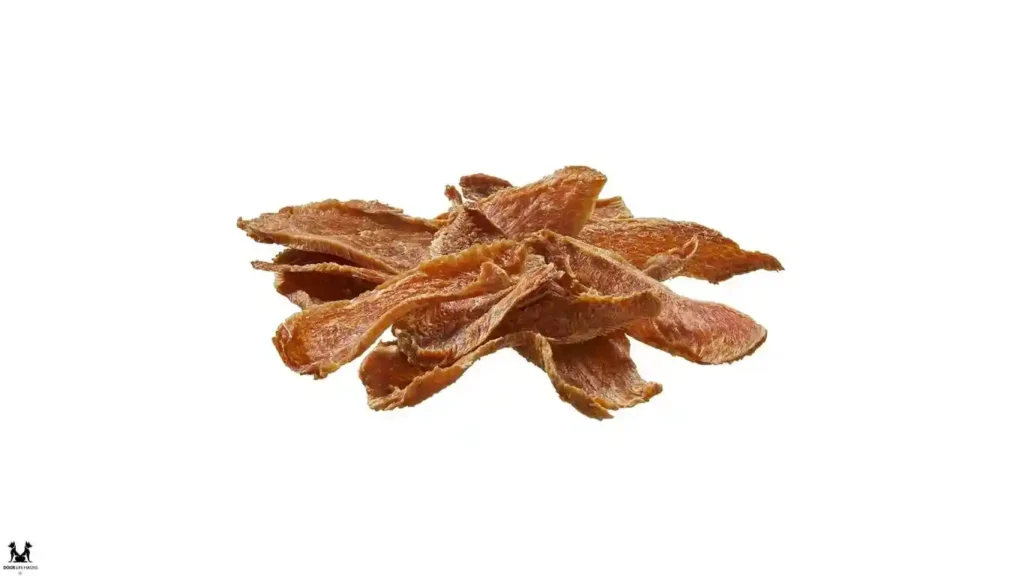
Why Turkey Jerky is a Great Treat
Turkey jerky is not only tasty for the dog but also can be considered in terms of the health benefits it has for dogs. It is a very healthy dried product that contains little fat but meals a lot of protein that serves as a good appetizer between meals. This is unlike most commercial dog treats that are processed with fillers and other artificial enhancements thus making the turkey jerky a nutritious treat.
How to Safely Offer Jerky to Dogs
Giving turkey jerky to your dogs, should, however, be a commercial turkey jerky for dogs. Certain human assistance jerky products may still have dangerous components such as onions or overly high levels of salt. Only give your dogs natural, preservative-free turkey jerky, and should be given in moderation to prevent your pet from overeating.
How to Transition Your Dog to Turkey-Based Food
Step-by-Step Guide to Switching Foods
Here are the steps to gradually switch your dog to a turkey-based food:
- Day 1-2: Use 25% of the turkey food with 75% of the usual food your dog eats.
- Day 3-4: Increase turkey food that is new to 50%, and lower the old turkey food to 50%.
- Day 5-6: Mix 75% of the new turkey food along with 25% of the leftover food.
- Day 7-10: Give your dog 100% of the new food made from turkey.
This evolutionary approach enables your dog’s digestive tract to make a smooth transition to the new diet.
Common Issues During Food Transitions
Some dogs during the switch to new food may experience relatively mild digestive issues like diarrhea or vomiting. Once your dog’s body readjusts, this should become temporary and subside. To smooth the changeover, it’s possible to add either probiotics or pumpkin to their meals, which might help alleviate digestive distress. For more than just a couple of days, it is in your best interest to reach out to your vet if symptoms continue.
Homemade Turkey Dog Food Recipes
Simple, Balanced Recipes for Homemade Turkey Dog Food
Homemade turkey dog food can be a nutritious choice if you love making meals for your dog. An easy recipe features ground turkey, rice that has been cooked, and a combination of vegetables suitable for dogs, which include carrots and peas. For a balanced meal, consider adding a supplement such as fish oil or a dog multivitamin. Make sure to check with your vet that your homemade dishes cater to your dog’s nutritional needs.
Turkey-Based Dog Food for Allergies
How Turkey Can Help with Food Sensitivities
Dogs allergic to usual proteins like beef or chicken may find Turkey to be a wonderful option for their diet. Considered a novel protein, it’s free from common allergens, which makes it an excellent choice for an elimination diet. Dog food from Turkey is usually free of grains and artificial additives, which can diminish the likelihood of allergic reactions.
Best Turkey Dog Food Brands for Dogs with Allergies
It is important to look for quality brands when purchasing turkey dog food for dogs with allergies. Products containing turkey as the top ingredient along with few, natural ingredients are the ones to look for. Branded turkey dog food from Wellness, Canidae, and Natural Balance is renowned for its hypoallergenic properties which make it great for dogs with sensitivities.
Is Turkey Dog Food Safe for All Breeds?
Considerations for Different Dog Breeds
While generally safe for all dog breeds, there are unique considerations for both the size and breed of your dog about Turkey dog food. Different from larger breeds, smaller breeds require less food, although they need a high concentration of nutrients in that food. It’s important to find a dog food that corresponds with your dog’s breed, age, and activity level to make sure they receive the correct nutrient balance.
Small vs. Large Breed Dietary Needs
| Aspect | Small Dogs | Large Dogs |
|---|---|---|
| Metabolism | Faster metabolism, requiring calorie-rich food | Slower metabolism, needing balanced calorie intake |
| Food Digestibility | Benefit from easily digestible food like turkey | Require digestible food, but with focus on joint support |
| Caloric Needs | Higher calories per pound due to faster metabolism | Moderate calories to avoid excessive weight gain |
| Joint Health | Typically less prone to joint issues | Need food with glucosamine and chondroitin for joint care |
| Turkey Protein Benefits | Provides energy and easy digestion for active small dogs | Supports muscle mass and overall health in large breeds |
| Food Portion Size | Smaller portions but more calorie-dense | Larger portions, designed to meet size and weight needs |
- Large dogs need food that supports joint health and muscle maintenance, whereas turkey can be a lean protein option, combined with ingredients like glucosamine and chondroitin.
- Small dogs benefit from turkey dog food as it’s calorie-dense, digestible, and energy-packed to match their fast metabolism.
Turkey vs. Chicken Dog Food
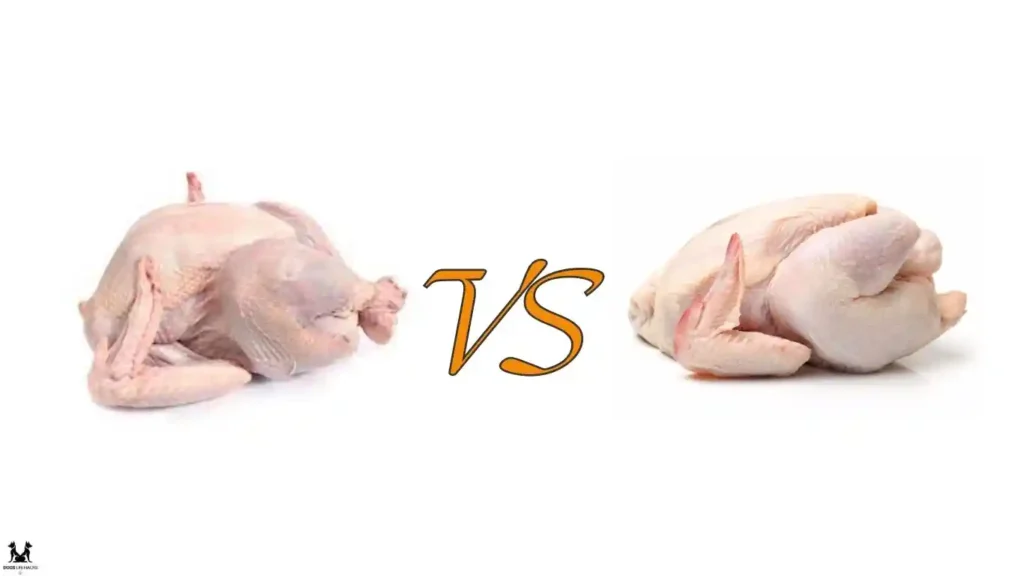
| Nutrient | Turkey | Chicken |
|---|---|---|
| Fat Content | Lower in fat, ideal for weight control | Slightly higher fat content |
| Protein | High-quality, lean protein | High-quality, commonly used protein |
| Vitamin B12 | Higher in B12, supports energy & nerves | Moderate levels of B12 |
| Allergies | Ideal for dogs needing low-fat diets or a variety | More common in dog food, potential allergen |
| Taste & Variety | Less common in dog food, and better for dogs with chicken allergies | Familiar and well-tolerated taste by most dogs |
| Common Uses | Ideal for dogs needing low-fat diets or variety | Regularly used in commercial dog food |
- Turkey may be a better option for dogs needing a leaner protein source or those with chicken allergies.
- Chicken is a reliable protein for dogs without dietary issues, though it can sometimes cause allergies.
Best Turkey Dog Food Brands
Top-Rated Brands for Turkey Dog Food
Many top brands provide outstanding turkey dog food alternatives. Leading brands such as Blue Buffalo which uses real turkey in its first ingredients and Merrick which supplies grain-free turkey food supplemented with joint nutrients are popular options. These brands lead with whole, natural ingredients, which makes them a wonderful preference for owners wanting the top options for their pets.
What to Look for When Choosing a Turkey Dog Food Brand
Make sure that real turkey is the leading ingredient when you choose a brand of turkey dog food. Exclude foods that include corn or soy fillers, and try to find brands that stress natural, whole ingredients. On top of that, be sure to look for supplemental nutrients such as omega-3 fatty acids, which help keep the coat in good condition, and probiotics to improve digestive health.
Final Thoughts
Feeding your dog turkey can deliver a selection of health advantages, including lean protein along with vital vitamins and minerals. When it comes to choosing between raw turkey, turkey kibble, or wet food, turkey provides a nutritious choice that helps maintain your dog’s total health. Always be sure to talk to your veterinarian before altering your dog’s diet significantly to confirm it meets their personal needs.
Frequently Asked Questions
Is turkey dog food good for dogs?
You may also have observed that turkey is a popular ingredient in dog treats and dog food. However, properly cooked, skinless, unseasoned white turkey meat is safe for dogs to eat in moderation. It is also completely safe to feed your dog ground turkey as long as it does not contain any additives.
Is turkey better than chicken for dogs?
Turkey is an important source of protein and a better choice for your dog than chicken because Turkey has 70% of white meat.
Is turkey or salmon better for dogs?
While turkey is not as high in omega-3 fatty acids as salmon, which are useful for fighting inflammation and maintaining healthy skin, it is still a good source of these acids.
What is the healthiest meat for dogs?
Chicken, turkey, lean ground beef, and chuck steak or roast are sources of animal-based proteins and are important for building muscles in dogs. A few rules apply: Always cook meat well. Do not consume it raw or prepared in a rare format.
Can dogs eat turkey every day?
Yes, because like for people, feeding dogs turkey should be moderate and moderate, and when well cooked and prepared it is safe for dogs to consume. Ensure that it is thoroughly done; it has no skin, bones, or fat and it was not cooked with any other accompaniment or spices.
Related Blogs
